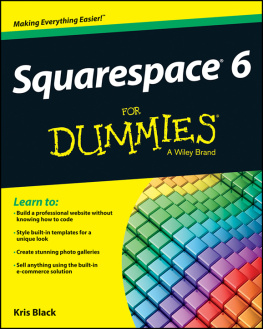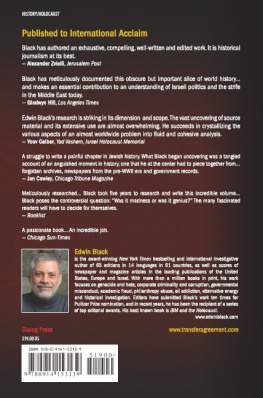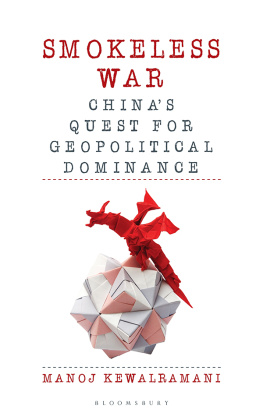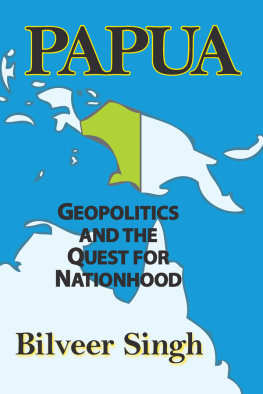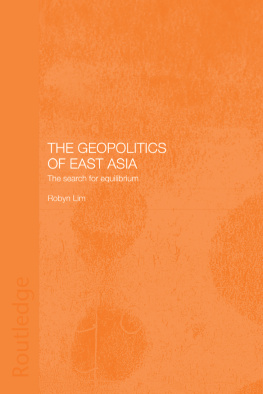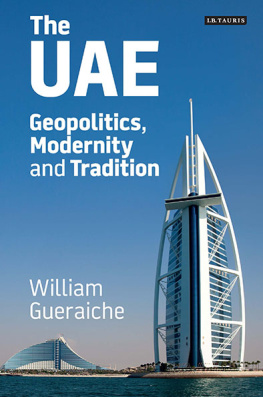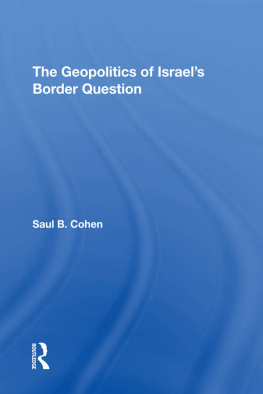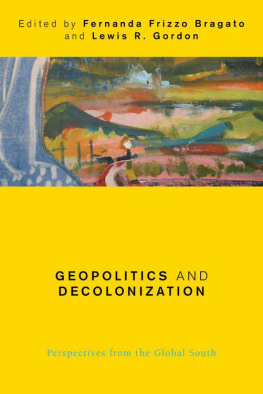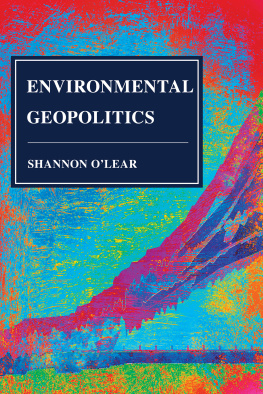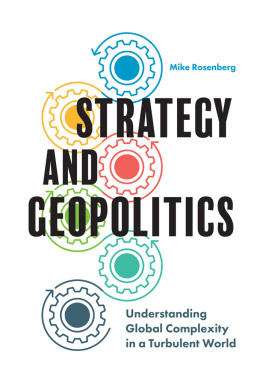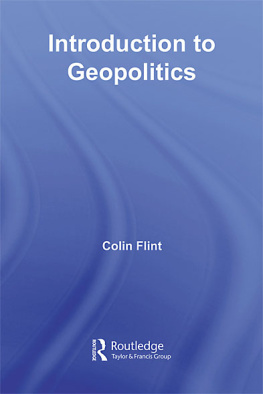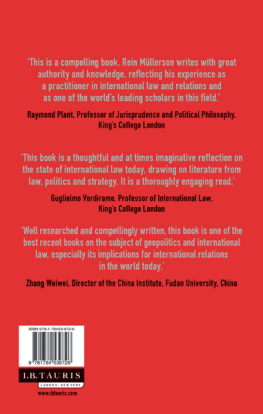Black - Geopolitics and the Quest for Dominance
Here you can read online Black - Geopolitics and the Quest for Dominance full text of the book (entire story) in english for free. Download pdf and epub, get meaning, cover and reviews about this ebook. City: Bloomington, year: 2016, publisher: Indiana University Press, genre: Politics. Description of the work, (preface) as well as reviews are available. Best literature library LitArk.com created for fans of good reading and offers a wide selection of genres:
Romance novel
Science fiction
Adventure
Detective
Science
History
Home and family
Prose
Art
Politics
Computer
Non-fiction
Religion
Business
Children
Humor
Choose a favorite category and find really read worthwhile books. Enjoy immersion in the world of imagination, feel the emotions of the characters or learn something new for yourself, make an fascinating discovery.

Geopolitics and the Quest for Dominance: summary, description and annotation
We offer to read an annotation, description, summary or preface (depends on what the author of the book "Geopolitics and the Quest for Dominance" wrote himself). If you haven't found the necessary information about the book — write in the comments, we will try to find it.
Black: author's other books
Who wrote Geopolitics and the Quest for Dominance? Find out the surname, the name of the author of the book and a list of all author's works by series.
Geopolitics and the Quest for Dominance — read online for free the complete book (whole text) full work
Below is the text of the book, divided by pages. System saving the place of the last page read, allows you to conveniently read the book "Geopolitics and the Quest for Dominance" online for free, without having to search again every time where you left off. Put a bookmark, and you can go to the page where you finished reading at any time.
Font size:
Interval:
Bookmark:
Geopolitics and the Quest for Dominance
Jeremy Black

This book is a publication of
INDIANA UNIVERSITY PRESS
Office of Scholarly Publishing
Herman B Wells Library 350
1320 East 10th Street
Bloomington, Indiana 47405 USA
iupress.indiana.edu
2016 by Jeremy Black
All rights reserved
No part of this book may be reproduced or utilized in any form or by any means, electronic or mechanical, including photocopying and recording, or by any information storage and retrieval system, without permission in writing from the publisher. The Association of American University Presses Resolution on Permissions constitutes the only exception to this prohibition.
The paper used in this publication meets the minimum requirements of the American National Standard for Information SciencesPermanence of Paper for Printed Library Materials, ANSI Z39.48-1992.
Manufactured in the
United States of America
Cataloging information is available from the Library of Congress.
ISBN 978-0-253-01868-7 (cloth)
ISBN 978-0-253-01870-0 (paperback)
ISBN 978-0-253-01873-1 (ebook)
1 2 3 4 5 21 20 19 18 17 16
For Jane Hayball and Mark Ormerod
HISTORY AND GEOGRAPHY DEFINE THE OPERATION OF POWER, not only its range but also the capacity to plan and the ability to implement. The study of power in time and spaceand, more specifically, foreign policy and military actionis therefore an important element in the understanding of international relations, military history, and the development of states and of state systems. This study is the subject of this book. It provides a significant angle on strategy and policy, the spatial angle, and relates this angle to the changing perceptions of commentators. These perceptions throw light on the understanding of power and the international system. These perceptions also prove an important aspect of the soft power and related practice of acceptance (if not compliance) that are so important to the reality of power, both on the international scale and within states.
Thus, geopolitics, although claiming in some hands a scientific precision, is as much about ideas and perception as it is about the actual spatial dimensions of power. Moreover, the latter themselves are not as precise as they might appear. Indeed, the real, latent and possible, spatial sources and degrees of strength are all open to debate. Certainly that helps explain why the subject of geopolitics is both fascinating and valuable, for it throws light on how ideas have developed and on the varying political resonances of control over space. As such, the subject repays consideration.
History and geography: this book also reflects two linked interests of mine. As a historian, I have always been fascinated by geography; indeed I nearly took the subject as a university student. Subsequently, I have pursued the interest with a number of books on maps and also in my teaching. This concern with geography is relatively unusual among British or American historians, which unfortunately helps impoverish the subject. In this book, I am in part troubled by not only the lack of engagement with geopolitics on the part of most historians, but also by the modish and somewhat politicized account of geopolitics provided from within the discipline of geography. Thus, this book can be understood, in part, as a sequel to my Maps and Politics (1997).
In addition, while writing in the mold of classical geopolitics, I take the opportunity to introduce various understandings of geopolitics and to probe them over a longer chronological range than is conventional. The purposes of the book are, first, to bring up to date the scholarship in this area; second, to create a much broader temporal and conceptual framework for envisioning the subject; third, to consider several new methodologies and disciplines in the field; fourth, to appraise leading geopolitical thinkers, as well as governmental figures tapping into their doctrines; fifth, to assess the consequences of incomplete and opportunistic geopolitical theorizing and execution; sixth, to recast geopolitics and its policy implications in the era that followed the end of the Cold War and the collapse of the Soviet Union; seventh, to demonstrate that the fluidity, indeed mutability, of geopolitics is conceptually both an opportunity and a problem; and last, to suggest that only through incorporating all possible inputs can geopolitical thinking be a liberating force in the world order. Geopolitics emerges as most useful as a sphere for consideration, and not as a formal analytical doctrine. Moreover, the historical dimension is crucial. While geopolitics provides a valuable way to study influences and pressures, it risks a serious ahistoricism unless sufficient weight is placed on contemporary understandings of these processes.
I have benefited from teaching a maps and history course at Exeter and from lecturing at the Strategy and Security Institute there, while opportunities to give outside lectures also helped me clarify aspects of my argument. These venues included the 2002 History Institute for Teachers, on Teaching Geography and Geopolitics; the Carls-Schwardefeldt lecture at Union University; and lectures to the Foreign Policy Research Institute (FPRI), the University of Pennsylvania, Temple University, Waseda University, a Development, Concepts and Doctrine Centre-Mackinder Forum Workshop at Shrivenham, the Japanese National Institute of Defence Studies, the Japanese Press Club, RUSIs Japanese branch, a conference on the Limits of Empire in the Early Modern World, held in Columbus, Ohio, and another titled Maritime Security in the Twenty-First Century, held in Copenhagen.
I am most grateful to Mike Mosbacher for giving me permission to use material already published by the Social Affairs Unit, and to John Andrews, Brian Blouet, Pete Brown, Kelly DeVries, Klaus Dodds, Gwilym Eades, Colin Flint, Leonard Hochberg, Alex Johnson, Phil Kelly, Matthew Mosca, Rupert Smith, and Marin Solarz for their comments on all or part of earlier drafts, and to advice from Ahron Bregman, Peter Cain, Sean Carter, David Cohen, Art Eckstein, John France, Jan Glete, Michael Grow, Andrew Lambert, Stewart Lone, Peter Lorge, Timothy May, Rana Mitter, Keith Neilson, Ryan Patterson, Susan Schulten, Harvey Sicherman, Joe Smith, Gareth Stansfield, and Hywel Williams. None is responsible for any errors that remain. Bob Sloan has again proved a most helpful publisher. It is a great pleasure to dedicate this book to two good and longstanding friends, whose company and joie de vivre give Sarah and me great pleasure.
ADD Additional Manuscripts
AE Paris, Ministre des Relations Extrieures
ANG Angleterre
BL London, British Library
CP Correspondance Politique
FO Foreign Office
LH London, Kings College, Liddell Hart Archive
NA London, National Archives
SP State Papers
Geopolitics and the Quest for Dominance
Geography provides strategy with an underlying continuity.
HEW STRACHAN
EMPLOYED FROM 1899, GEOPOLITICS IS AN AMORPHOUS concept, both efficacious and misfiring, and a plastic or malleable (as well as controversial) term. Different working definitions have been advanced, and there is no universally accepted definition and, indeed, no agreed definition in English. All definitions of geopolitics focus on the relationship between politics and geographical factors, although that relationship has been very differently considered and presented. In this context, politics is approached principally in terms of the composition and use of power. The geographical factors that are treated vary, but space, location, distance, and resources are all important. Geopolitics is commonly understood as an alternative term for all or part of political geographyinvolves subjective as well as objective considerations, and the significance of the former is commonly downplayed. This is true across the varied dimensions of geopolitics.
Next pageFont size:
Interval:
Bookmark:
Similar books «Geopolitics and the Quest for Dominance»
Look at similar books to Geopolitics and the Quest for Dominance. We have selected literature similar in name and meaning in the hope of providing readers with more options to find new, interesting, not yet read works.
Discussion, reviews of the book Geopolitics and the Quest for Dominance and just readers' own opinions. Leave your comments, write what you think about the work, its meaning or the main characters. Specify what exactly you liked and what you didn't like, and why you think so.

